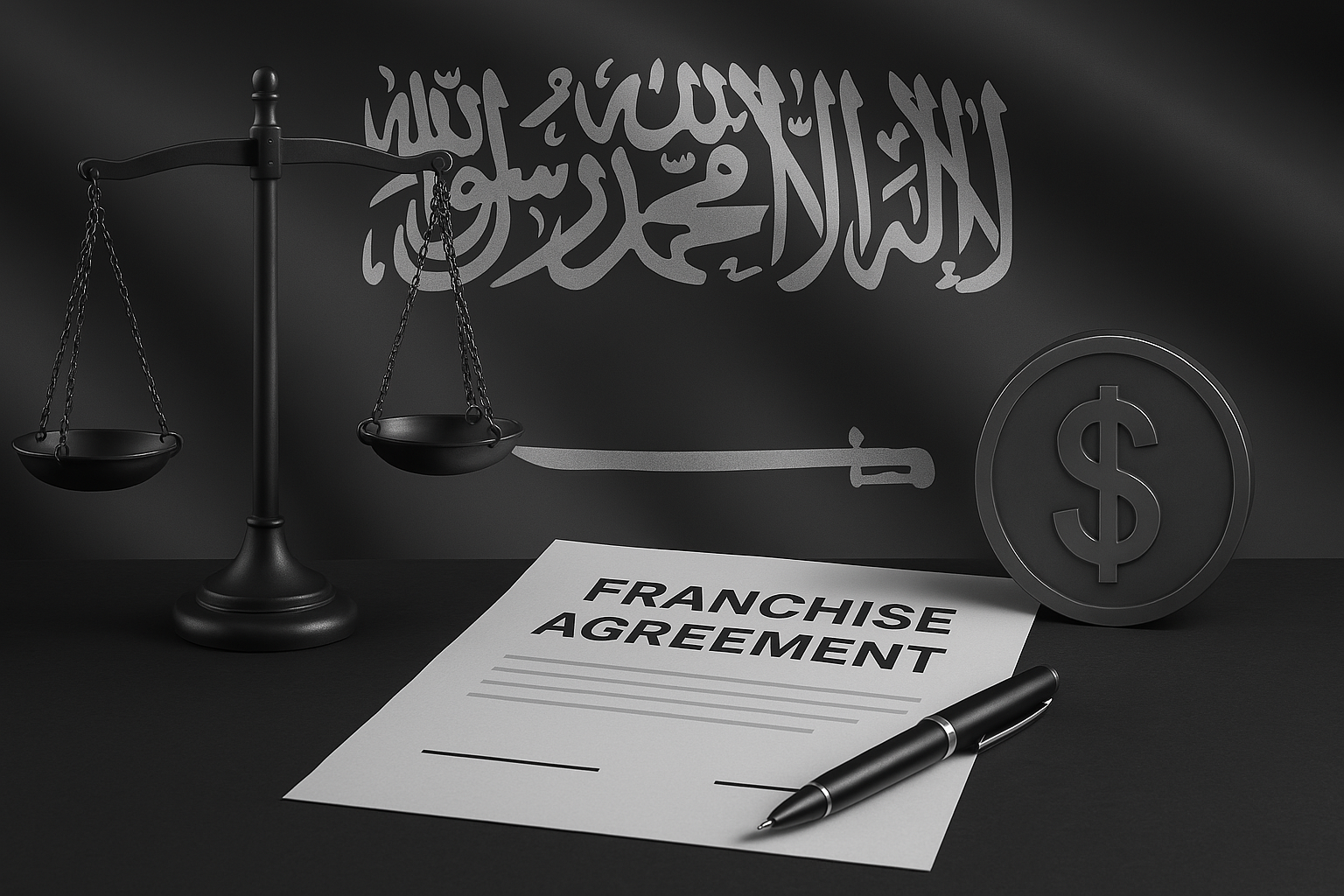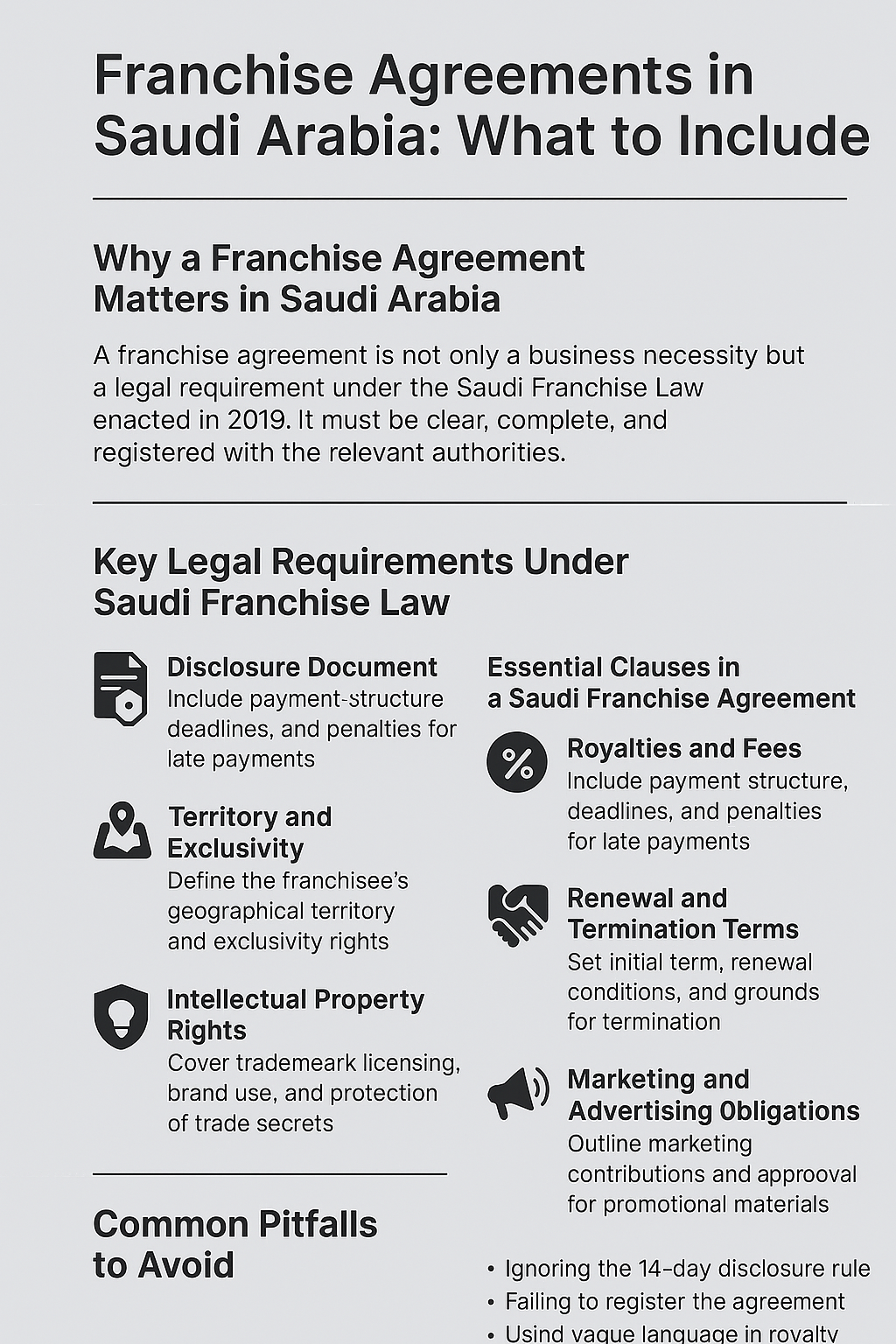Franchise Agreements in Saudi Arabia: What to Include

Entering into a franchise agreement in Saudi Arabia requires careful attention to local laws and regulations. A well-drafted agreement is essential to protect the interests of both the franchisor and the franchisee, ensure compliance with Saudi Franchise Law, and maintain long-term business success. In this blog post, we will explore the key elements to include in a franchise agreement in Saudi Arabia, covering legal requirements, IP rights, royalties, and more.
Why a Franchise Agreement Matters in Saudi Arabia
A franchise agreement is the legal foundation of any franchising relationship. In Saudi Arabia, this document is not only a business necessity but also a legal requirement under the Saudi Franchise Law enacted in 2019. It must be clear, complete, and registered with the relevant authorities.
Key Legal Requirements Under Saudi Franchise Law
To comply with Saudi Franchise Law, the franchise agreement must include the following:
- Disclosure Document: Franchisors are required to provide a disclosure document to prospective franchisees at least 14 days before signing the agreement.
- Registration: The franchise agreement must be registered with the Ministry of Commerce to be legally enforceable.
- Language: Agreements must be in Arabic or accompanied by an accurate Arabic translation.
Failure to comply with these requirements can lead to nullification of the agreement or penalties.
Essential Clauses in a Saudi Franchise Agreement
To ensure your franchise agreement in Saudi Arabia is legally sound and commercially effective, include the following clauses:
1. Royalties and Fees
- Percentage of gross or net sales
- Lump-sum payments or periodic fees
- Payment deadlines and penalties for late payments
2. Territory and Exclusivity
- Clearly define the franchisee’s geographical territory
- State whether it is exclusive or non-exclusive
- Restrictions on opening additional locations
3. Renewal and Termination Terms
- Initial term and renewal conditions
- Grounds for termination by either party
- Obligations upon termination, such as brand removal
4. Intellectual Property Rights
- Trademark licensing and brand use
- Software or digital tools usage
- Protection of trade secrets
5. Marketing and Advertising Obligations
- Local and national marketing contributions
- Approval requirements for promotional materials
- Social media and online marketing responsibilities
Franchise Disclosure Document and Registration
Before entering into a franchise agreement in Saudi Arabia, the franchisor must submit a Franchise Disclosure Document (FDD). This document includes:
- Business background of the franchisor
- Legal history and litigation
- Financial performance representations
- Initial and ongoing costs for the franchisee
The FDD and the franchise agreement must be registered with the Ministry of Commerce before any franchise activity can begin.
Dispute Resolution and Governing Law
Your franchise agreement in Saudi Arabia should clearly state how disputes will be handled. Options include:
- Mediation or Arbitration: Many parties prefer arbitration under Saudi or international rules.
- Jurisdiction: Specify whether disputes will be handled under Saudi law and in Saudi courts.
Clear dispute resolution clauses protect both parties and avoid confusion in the event of disagreements.
Common Pitfalls to Avoid
Avoid the following mistakes when drafting a franchise agreement in Saudi Arabia:
- Ignoring the 14-day disclosure rule
- Failing to register the agreement
- Using vague language in royalty and IP clauses
- Skipping renewal and termination details
Conclusion

Creating a compliant and detailed franchise agreement in Saudi Arabia is crucial for franchisors and franchisees alike. From disclosure requirements to royalty terms and IP protection, every clause should be thoughtfully drafted. By following Saudi law and best practices, you can build a solid foundation for your franchise business in the Kingdom.


Leave a Reply